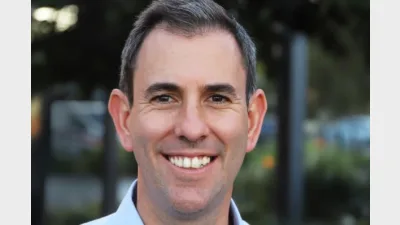Chalmers lobbies US Treasury Secretary on section 899 concerns affecting super



Treasurer Jim Chalmers has held talks with US Treasury Secretary Scott Bessent, intensifying efforts to resolve concerns over section 899 of the proposed “Big Beautiful Bill” in the United States.
Chalmers said the discussions, which included issues around critical minerals, international tax, and trade tariffs, centred heavily on the implications of section 899 for Australian institutional investors, including superannuation funds and the Future Fund.
“I know that there’s a lot of concern among our Australian institutional investors – super funds, the Future Fund and other institutions – when it comes to section 899 of the proposed so called Big Beautiful Bill in the US,” Chalmers said.
“I’ve engaged a lot with Australian investors over the course of the last couple of weeks on their concerns. I was able to represent them and raise their concerns directly with US Treasury Secretary Bessent. And I know that the Treasury Secretary is very focused on these issues as well. We hope that they can be resolved.”
Section 899, part of US congressional proposals, has raised fears that Australian funds could face unfair treatment or disadvantage in the evolving US tax landscape.
Chalmers emphasised that Australian authorities are pushing for a resolution that protects the interests of domestic investors operating internationally.
“We do not want to see our investors and our funds unfairly treated or disadvantaged when it comes to developments out of the US Congress,” the Treasurer said.
“I’m very grateful to Scott Bessent for hearing me out and for also undertaking to make what progress he can to try and resolve these issues. I’m confident he understands these issues.
“They’ve been raised with him directly. I was able to raise them directly with him as well, and we hope for some good developments on this front in the coming days. If not the coming days, then certainly the coming weeks.”
Earlier this week, Super Review reported Australian investors with US exposure are closely monitoring developments in the US, with some reassessing their positions and pausing new investments.
Namely, Stuart Eliot, AMP’s head of portfolio management, told Super Review sister brand InvestorDaily the firm is taking a “cautious approach” as it reviews its strategy in response to the proposed tax reforms.
“With ongoing uncertainty around proposed US tax reforms – particularly the Section 899 provision – we’re taking a cautious approach to new long-term investments in the US,” Eliot said.
“This isn’t a reflection of the broader US economy, but a prudent pause while we assess our long-term investment strategy.”
While other institutional investors are known to be watching the legislation closely, AMP is one of the few to publicly acknowledge a shift in capital deployment due to the potential implications of the Trump administration’s sweeping tax proposals.
In its recent analysis, Pitcher Partners warned that Australia could be caught by the bill if it passes.
While two versions exist – one from the House and a deferred one from the Senate – both pose a threat, targeting countries deemed to have “unfair foreign tax” policies.
Despite the Senate’s 12-month reprieve and narrowed scope, section 899 could still significantly reshape how foreign-owned entities are taxed on US income. Should Australia be deemed to have targeted tax practices, Pitcher Partners cautioned Canberra may face pressure to reform its laws to avoid being labelled an “offending” or “discriminatory” jurisdiction.
Earlier this month, AMP’s chief economist Shane Oliver highlighted section 899 as a significant factor eroding confidence in the US as a safe haven for investment. He suggested that global investors may demand higher risk premiums for US assets, including shares, bonds, and the US dollar in response to the proposed tax changes.
“I suspect it’s likely to be a slow burn and US tech and particularly AI dominance will serve as a powerful offset for some time to come. But it means ongoing bouts of high uncertainty and volatility,” he said at the time.
Greg Combet, chair of the Future Fund, also highlighted in a speech to the Committee for Economic Development of Australia earlier this month that Trump’s Big Beautiful Bill – particularly section 899 – could “potentially and dramatically” increase tax rates for Australian institutional investors such as the Future Fund.
“In combination, these policies and dynamics are making the US a more risky and uncertain investment destination,” he said.
Factors such as the bill are alerting investors that elevated risk demands a higher return on capital and that they may be overweight US assets, Combet added.
Noting that the US will “undoubtedly” continue to offer “many attractive investment opportunities”, he elaborated that the fund is giving further consideration to the medium- and long-term implications and is allocating “more time and resources to investigating other markets”.
“We are considering the need to build the physical portfolio in a more diversified way,” he said.
Recommended for you
The Gateway Network Governance Body has unveiled a detailed roadmap to guide the superannuation industry through the upcoming Payday Super reforms.
CPA Australia urges the ATO to extend compliance support for small businesses facing major system changes ahead of Payday Super reforms.
Superannuation funds ramp up collective efforts to counter rising cybercrime, updating standards and sharing intelligence across the industry.
The regulator has fined two super funds for misleading sustainability and investment claims, citing ongoing efforts to curb greenwashing across the sector.









